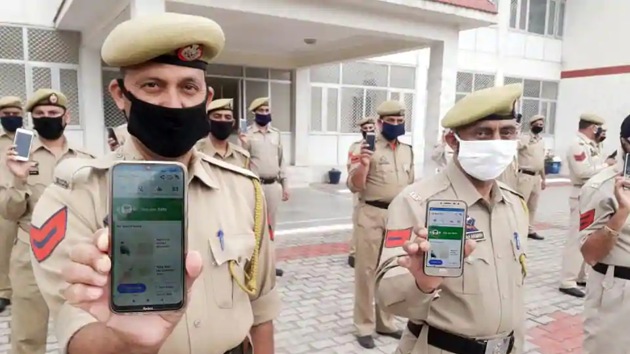Centre tells its employees to download Aarogya Setu app
The measure comes ahead of what may be a phased return-to-work period over the next month when the nationwide lockdown meant to curb the spread of the coronavirus disease (Covid-19) is relaxed in some places.
The central government has ordered all of its departments to ensure their staff install the Aarogya Setu mobile application and attend offices only if they have been classified as “safe” or “low risk” according to it, according to an order issued on Wednesday.

The measure comes ahead of what may be a phased return-to-work period over the next month when the nationwide lockdown meant to curb the spread of the coronavirus disease (Covid-19) is relaxed in some places.
According to the order, all officers and staff, including outsourced resources, must install the application. “Before starting for office, they should review their status on Aarogya Setu and commute only when the app shows ‘safe’ or ‘low risk’ status,” the order says.
The order, issued by the Department of Personnel and Training, instructed joint secretaries (administration) across departments to ensure the directions are strictly followed.
The Aarogya Setu detects others mobile devices running the programme in its proximity, creating a digital trail of close contact between people that, officials say, can speed up the identification and isolation of people who may have been exposed to Covid-19.
The application is similar to what has been rolled out in several countries, such as Singapore. It uses the Bluetooth module in modern-day smartphones to transmit its presence to, as well as record that of others, running the Aarogya Setu programme in close proximity.
According to its developers, it creates a risk profile of users by querying the list of devices they came close to against a centralised database of Covid-19 infected persons. Those regarded high risk are advised to self-quarantine for 14 days.
The application, downloaded by roughly 80 million Indians, has triggered criticism from privacy experts who say that there is no transparency in how the sensitive personal data collected by the app – address book details and location history – will be used.
“There are many problems with the app,” said Apar Gupta, a lawyer at the Internet Freedom Foundation. “There is a privacy concern, and a cyber security one. All the information is stored on a backend server. There may be a possible security threat. People who are working with the government, their movements will be tracked at all times. The only form of restraint is the privacy policy which may be changed anytime,” Gupta said.
Independent security researcher Srinivas Kodali said that the app collects “information but doesn’t not provide essential information.” “The app has security features, yes,” Kodali said. “It is an experiment with a good aim that may fall flat. The question remains how is data used and who has access to the data collected. The essential problem is a trust deficit when it comes to the government. It is a surveillance app.”
Kodali added that the app isn’t very useful unless a majority of the people download it.
According to Arnab Kumar, program director and a member of the Aarogya Setu core team, “the benefit of the app lies in its ability to automatically contact trace”. The app collects the name, phone number, sex, and travel history of the person over the last 30 days.
According to officials in government think tank NITI Aayog, the data is stored for around 45 days after which it is deleted if a person is not at risk.
“Security and privacy concerns have been paramount while designing the app,” Kumar said. “Each phone number is assigned a unique id and once someone is found Covid-19 positive, the app traces other unique ids the person has come in contact with. Using Bluetooth technology we can determine the time and distance the persons maintained and thus, warn others who may be at risk.”
Kumar added that the data is stored with the government and accessible to only those who are directly involved in battling the Covid-19 pandemic.
Get Current Updates on India News, Ram Navami Live Updates , Lok Sabha Election 2024 live, Elections 2024, Election 2024 Date along with Latest News and Top Headlines from India and around the world.



